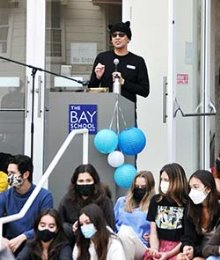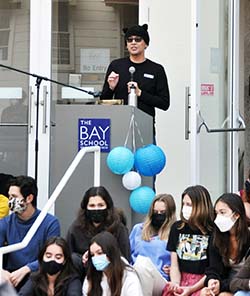
Founding staffulty member Shadow (Dave) Wang was the first community member to present at Morning Meeting for the 2021-2022 school year. Below is a transcript of his talk.
The Bay School, Episode IV: A New Hope
Imagine that you’re walking across the Golden Gate Bridge. The skies are clear and sunny when you start out, but halfway across, the fog suddenly rolls in, and you are surrounded by clouds. When you look behind you, you can barely see where you’ve come from. And when you look ahead, you can only see a dim picture of where you are going. But when you test the path beneath your feet, you feel supported by something very strong and solid.
I first heard that story from Malcolm Manson, Bay’s founding Head of School. He told it to the year 1 staffulty shortly before Bay opened its doors to students for the very first time in 2004. It applied to us as a school then, and I think it applies equally well to our situation today.
After the past year and a half, I know full well that I need to evolve as a teacher. I cannot simply do things the way I did them before. Bay as an institution knows that it needs to evolve as well. The pandemic has changed what’s mission-critical, what’s helpful, and what we can let go of. And even though I think both Bay as a school and I as a teacher will ultimately become much, much better as a result of this evolution, change is hard and scary. So right now, I think we’re standing in the middle of the Golden Gate Bridge, surrounded by fog and unable to see with any degree of certainty what lies in front of us. And yet, what sits directly beneath us is solid.
What I’d like to share with you in the rest of this talk are two specific things about Bay that help provide that foundational support.
Thing #1. Bay embraces who you are. You can bring your whole self to school every day.
Honestly, I feel that I just quoted the admissions website of every independent school in San Francisco. But let me give you some examples from my own experiences here at Bay about what it’s meant to me in the past.
I’ve taught at two schools in my 32 year teaching career, and at both, I was the first person in the community to come out as LGBTQ+. The first time, I was at a boarding school in rural Delaware, and my decision to come out as a gay man went well, but it was considered an unusual act of extraordinary bravery. People called me a hero. Flash forward to Bay in July 2004. In the very first staffulty meeting ever about two months before we opened our doors for the first time, we were invited to share why we’d chosen to leave our previous jobs and help create this thing called the Bay School. One of the reasons I shared was that rural Delaware had turned out to not be a great place to be the kind of gay man I wanted to be.
You see, when I got to Bay, I realized that I was part of building a brand-new school that could be anything we wanted it to be, and I wanted it to be a school where coming out was ordinary, not extraordinary. Last week, I got to spend time with our new staffulty, and I was thrilled to hear some of them speak very matter-of-factly about their same-sex partners.
Yay.
But it’s important to note that bringing your whole self to school goes far beyond just your sexual identity.
Let’s talk about learning differences. I’m ADHD, and I tell my students that on the very first day of class simply because it impacts how I need to do some things as their teacher.
And I’ve often seen Bay students view learning differences through a similar lens. A few years ago, a neurotypical senior told me that during group projects, he loved it when his partners told him or reminded him about their learning differences at the start of the project because then he could help them play to their strengths. It wasn’t his partner sharing some terrible secret about themselves; it was sharing some information that made their collaboration more effective and helped him understand and empathize with one of his classmates a little bit better.
We have a lot of really hard work ahead of us this year, and knowing that I can bring my whole self to school each day without judgment means that I can focus on the things that really matter. That’s why it’s one of the 4things that provide us with something solid to stand on.
Here’s Thing #2. Bay has a growth mindset hardwired into its culture.
Exploring a growth mindset is at least a semester-long course, and I’m about to touch on it for a couple of minutes. If you want to learn more, please talk to Rachel Shaw, Bay’s excellent librarian. Plus, Rachel’s just awesome in general.
So what’s a growth mindset?
For me, adopting a growth mindset involves the strategic use of the word “yet”. Any time you find yourself thinking, “I can’t do _____,” you change it to “I can’t do _____ yet.” A major aspect of a growth mindset is the idea that intelligence is something that can be developed rather than something that you’re born with and then it’s fixed. So: “I can’t understand math. Yet.” “I can’t play the tuba. Yet.” “I can’t do the Chicken Dance. Yet.”
And if you think I’m kidding about the Chicken Dance, just wait.
So a growth mindset keeps you open to learning new things. But how does it help you learn them? One way is that you become receptive to critical feedback about your work without becoming defensive. At Bay, you get critical feedback from your teachers, of course, but you also get it from your fellow students, and we will train you on how to do so. Learning how to give critical feedback kindly and how to accept it with an open heart and mind is one of the most valuable skills we teach here at Bay.
A second way that a growth mindset helps you learn is that you see failure as an opportunity for improvement rather than as an indication of your lack of worth as a human being. The full statement of Bay’s precepts includes a final paragraph that says that we want Bay to be a place where everyone (not just students) can “make mistakes, learn from them, and grow”.
I’ve never seen this at play more strongly than in March 2020, when we shifted our classes from on campus to online. We went through multiple iterations of the daily class schedule in the first few weeks. Each new iteration came about because something about the current iteration hadn’t worked -- in other words, something had failed. Teachers had to try different ways of teaching and assessing, keeping the things that worked and learning from the things that didn’t. As a school, we made mistakes, learned from them, and grew.
So we’re walking across the Golden Gate Bridge, the fog rolls in, and we no longer can see clearly where we came from or where we’re going, and yet there’s something solid underneath us. I’ve described two things at Bay that help create that solidity -- that we can bring our whole selves to school, and our institutional growth mindset -- but there’s definitely more that we as a community can do.
Two homework assignments for all of us: first, keep an eye out for other things in your life that help keep the ground solid under your feet. And second, let’s all help each other find those things.
I decided to close this with a quote from Jemma Simmons, a character in the TV show Marvel’s Agents of SHIELD: “The steps you take don’t need to be big. They just need to take you in the right direction.”
Thanks for listening.












.jpeg&command_2=resize&height_2=85)





